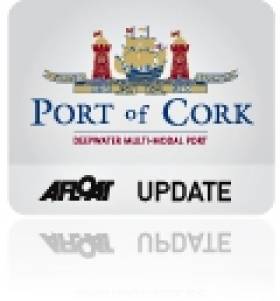Displaying items by tag: Irish port trade figures
‘Resilient’ Performance by Port of Cork in 2011
#PORT OF CORK - Port of Cork Company chairman, Mr Dermot O'Mahoney, yesterday announced end of year trade traffic results for the Port of Cork in 2011. He said: "Trade traffic has shown remarkable resilience recording 8.8 million tonnes despite experiencing challenging periods during 2011." These figures are on a par with 2010 figures at the Port of Cork.
A remarkable feature of the figures is the very positive effect on the local economy by the increase in exports from the Port. Total exports at the Port of Cork have remained strong increasing by 9% in comparison to 2010 and by 19% since 2009. Exports are a key driver in the successful recovery of the Irish Economy and the Port of Cork is committed to continuous support in the growth of international trade for both current and future economic prospects.
Although the growth in export volumes to pre –recession levels reflects the rapid "V" shaped bounce back by the export sector which was achieved despite the depressed international economic environment, import volumes are still 12.9% below 2007 levels. The continued low volume of imports is inevitably putting huge strain on the ports, shipping lines and transport sector servicing the country.
The container business at the Port of Cork has shown an increase of 5% with over 150,000 TEU handled in 2011. Animal feed stuffs, fertiliser and other trades have shown a marginal decrease in 2011. Oil traffic has remained steady despite the lower levels of domestic economic activity; however exports of refined product from Conoco Phillips Whitegate Oil Refinery has remained strong and continues to be a significant part of the Port of Cork business.
Remarking on the end of year trade traffic results, Mr Dermot O'Mahoney Chairman of the Port of Cork said: "The Port of Cork is pleased to announce that total trade traffic in 2011 has remained strong with exports increasing by 9% over 2010 volumes. With 98% of all goods imported or exported from Ireland moved by ship, the importance of ports to our economy is of vital strategic importance. The Port of Cork is a key link to the continued economic success of Ireland and in particular the entire Munster region. The challenge now facing the Port of Cork is to continue to develop to meet the needs of the Country as it emerges from this current recession. This requires that we be visionary and seize opportunities presented by emerging trends and logistic supply changes."
He continued: "While the next four to five years will be challenging for us all, we need to continue to promote the fact that Ireland is an excellent investment location and is well placed to capitalise on growing global markets as is evident by our export sector."
53 cruise vessels visited the Port of Cork during 2011 bringing over 100,000 passengers and crew to the region and the Port is scheduled to accommodate 60 vessels in 2012. According to research carried out by UK Consultants GP Wild, the average in-transit spend per passenger, while visiting an Irish port is between €73- €100 which provides a significant contribution towards the local tourism economy. In 2011 the Port of Cork won 1st place for 'Best Destination Experience (Organised)' in the world and 2nd place for 'Best Port Welcome' in the Dream World Cruise Destinations Awards. This achievement highlighted the outstanding team effort and commitment by the Port of Cork to deliver an excellent service to the visiting cruise lines and their passengers when in Cork. Ireland Inc. also received a Commendation as a "Destination where the Quality and Professionalism of Tour Guides is considered outstanding".
Port officials are pro-actively engaged with tourism interests, County and City Councils and destination attractions to enhance the product on offer to the visiting cruise lines with a view to growing the business further through its dedicated cruise terminal.
Ferry passenger numbers with Brittany Ferries remained steady on its weekly ferry service from Cork to Roscoff and the Port awaits the outcome of the Examinership of Fastnet Lines and the re-commencement of the ferry service linking Cork with Swansea.
The Port of Cork's recreational strategy continues to expand with the aim of improving the marine leisure facilities around Cork Harbour.
Mr O' Mahoney concluded by saying that "the Port of Cork must continue to reinforce its existing strength as the primary deep-water port in the south of Ireland and build on our progress so far by effectively resolving our challenges in an imaginative way and with a strong sense of urgency and determination."





























































